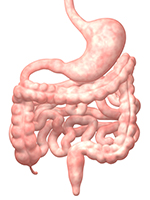Written By,
Dr. John W Phelts, D.C.
 It is Fall, the season when you count on your immune system to fight off the common cold and flu. This is the time of year when you want your immune system functioning optimally. One of the most effective ways to do this is to improve the health of your digestive system. You may ask yourself, “what does my gut have to do with my immune system”?
It is Fall, the season when you count on your immune system to fight off the common cold and flu. This is the time of year when you want your immune system functioning optimally. One of the most effective ways to do this is to improve the health of your digestive system. You may ask yourself, “what does my gut have to do with my immune system”?
FACT: 80% of your immune system is located in your gastrointestinal tract.
In light of this, wouldn’t it make sense to focus on your digestive system in order to have the greatest impact on your immune system? If our digestive tract is putting extra burden on our immune system (due to harmful bacteria or chronic inflammation), then how in the world can we expect it to effectively protect us from the common cold or flu at the same time?
In your digestive tract you have colonies of bacteria and yeast that are collectively called your Flora. Ideally, it consists of 100% beneficial bacteria, but there is also the potential for there to be bad bacteria as well. The good bacteria help to digest your food, produce energy for your body to use, and make vitamins that your body needs. They also help your immune system by detoxifying our intestines, preventing yeast overgrowth, and producing antibodies that fight infections and kill bad bacteria.
FACT: You actually have 10x more bacteria in your intestines than you have cells in your whole body.
Science has come to the realization that our flora is crucial to our health and cannot be overlooked. Dysbiosis is an imbalance of your Flora, which could be due to bad bacteria or yeast overgrowth. Dysbiosis results in poor digestion, decreased energy, decreased vitamins, and more stress on your immune system.
WHAT CAUSES DYSBIOSIS?
- Antibiotics- Antibiotics kill your good bacteria and allow an opportunity for bad bacteria to take root on your intestinal wall and for yeast to overgrow.
- Antacids- Antacids decrease the acidity of your stomach. Your good bacteria thrive in an highly acidic environment and die in an alkaline environment. In contrast bad bacteria thrive in alkaline and low acid environments.
- Alcohol consumption
- Diminshed HCL (hydrochloric acid) and/or bile production- HCL is the acid that your stomach produces. It is necessary for proper digestion and the survival of your good bacteria.
- Yeast infections- cause an imbalance between intestinal bacteria and intestinal yeast.
- Pain medication (Advil Motrin, etc.)- damages the lining of you stomach and intestines where your good bacteria live. If you look on the labels of these medications you will see a warning that it may cause gastric (stomach) bleeding.
- Viruses
 WHAT SYMPTOMS MAY INDICATE THAT I MAY HAVE DYSBIOSIS?
WHAT SYMPTOMS MAY INDICATE THAT I MAY HAVE DYSBIOSIS?
Those suffering from dysbiosis may experience a few or many of the following symptoms:
Nausea ● Belching ● Bloating ● Heartburn ● Abdominal pain ● Cramping ● Abdominal Distention ● Depression ● Anxiety ● Constipation ● Diarrhea ● Increased Colon Mucus ● Flatulence ● Bad Breath ● Joint Pain ● Brain fog ● Memory Deficit ● Depression ● Low Energy ● Muscle Pains ● Skin rashes
THE SOLUTION: GUT FLORA RESTORATION PROGRAM
If dysbiosis is not addressed, then it can lead to leaky gut syndrome, which is an increase in intestinal permeability. This allows undigested food particles, bacteria, toxic waste products to be absorbed into the blood stream. The good news is that dysbiosis is commonly addressed without the use of drugs or surgery. A sound flora restoration program should contain elements that 1) remove bad bacteria, 2) support the growth and strength of your resident good bacteria, and 3) repopulate your intestines with good bacteria.
1) Herbs that remove bad bacteria and yeast:
Berberine Sulfate- stimulates the immune system to cleanse itself.
Oregano Extract- helps remove fermented and harmful bacteria.
Pau d’Arco- is effective at eliminating excess yeast such as Candida. It also helps to remove harmful bacteria such as Staphylococcus aureus, Streptococcus, and Helicobacter pylori
2) Support Food For Your Good Bacteria (Prebiotics)
Larch tree arabainogalctan is a prebiotic. Feeding your good bacteria keeps them healthy so they can multiply and replace the bad bacteria on the intestinal walls. It is also a soluble fiber and immune system booster.
3) Repopulate
Probiotics are strains of good healthy flora that can be taken orally. They are great for individuals that have compromised levels of beneficial flora. They do help to remedy the imbalance, but they are a temporary solution, because they live in your gut for only two weeks.
Related Products:
| Remove | Support | Repopulate |
 |  |  |